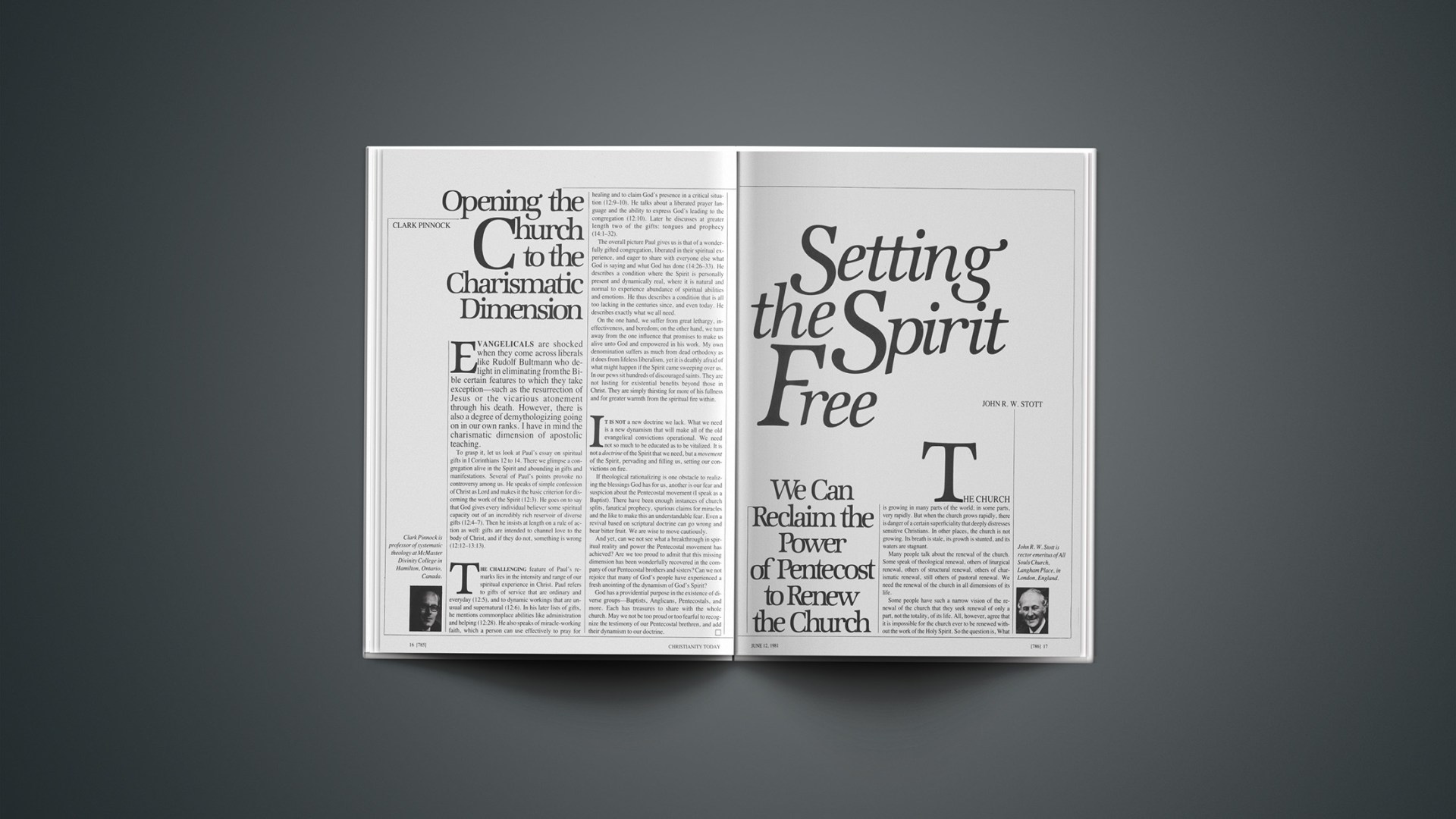Evangelicals are shocked when they come across liberals like Rudolf Bultmann who delight in eliminating from the Bible certain features to which they take exception—such as the resurrection of Jesus or the vicarious atonement through his death. However, there is also a degree of demythologizing going on in our own ranks. I have in mind the charismatic dimension of apostolic teaching.
To grasp it, let us look at Paul’s essay on spiritual gifts in 1 Corinthians 12 to 14. There we glimpse a congregation alive in the Spirit and abounding in gifts and manifestations. Several of Paul’s points provoke no controversy among us. He speaks of simple confession of Christ as Lord and makes it the basic criterion for discerning the work of the Spirit (12:3). He goes on to say that God gives every individual believer some spiritual capacity out of an incredibly rich reservoir of diverse gifts (12:4–7). Then he insists at length on a rule of action as well: gifts are intended to channel love to the body of Christ, and if they do not, something is wrong (12:12–13:13).
The challenging feature of Paul’s remarks lies in the intensity and range of our spiritual experience in Christ. Paul refers to gifts of service that are ordinary and everyday (12:5), and to dynamic workings that are unusual and supernatural (12:6). In his later lists of gifts, he mentions commonplace abilities like administration and helping (12:28). He also speaks of miracle-working faith, which a person can use effectively to pray for healing and to claim God’s presence in a critical situation (12:9–10). He talks about a liberated prayer language and the ability to express God’s leading to the congregation (12:10). Later he discusses at greater length two of the gifts: tongues and prophecy (14:1–32).
The overall picture Paul gives us is that of a wonderfully gifted congregation, liberated in their spiritual experience, and eager to share with everyone else what God is saying and what God has done (14:26–33). He describes a condition where the Spirit is personally present and dynamically real, where it is natural and normal to experience abundance of spiritual abilities and emotions. He thus describes a condition that is all too lacking in the centuries since, and even today. He describes exactly what we all need.
On the one hand, we suffer from great lethargy, ineffectiveness, and boredom; on the other hand, we turn away from the one influence that promises to make us alive unto God and empowered in his work. My own denomination suffers as much from dead orthodoxy as it does from lifeless liberalism, yet it is deathly afraid of what might happen if the Spirit came sweeping over us. In our pews sit hundreds of discouraged saints. They are not lusting for existential benefits beyond those in Christ. They are simply thirsting for more of his fullness and for greater warmth from the spiritual fire within.
It is not a new doctrine we lack. What we need is a new dynamism that will make all of the old evangelical convictions operational. We need not so much to be educated as to be vitalized. It is not a doctrine of the Spirit that we need, but a movement of the Spirit, pervading and filling us, setting our convictions on fire.
If theological rationalizing is one obstacle to realizing the blessings God has for us, another is our fear and suspicion about the Pentecostal movement (I speak as a Baptist). There have been enough instances of church splits, fanatical prophecy, spurious claims for miracles and the like to make this an understandable fear. Even a revival based on scriptural doctrine can go wrong and bear bitter fruit. We are wise to move cautiously.
And yet, can we not see what a breakthrough in spiritual reality and power the Pentecostal movement has achieved? Are we too proud to admit that this missing dimension has been wonderfully recovered in the company of our Pentecostal brothers and sisters? Can we not rejoice that many of God’s people have experienced a fresh anointing of the dynamism of God’s Spirit?
God has a providential purpose in the existence of diverse groups—Baptists, Anglicans, Pentecostals, and more. Each has treasures to share with the whole church. May we not be too proud or too fearful to recognize the testimony of our Pentecostal brethren, and add their dynamism to our doctrine.










